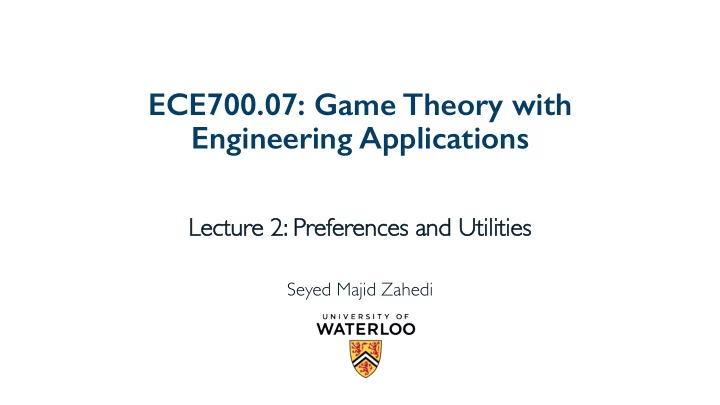

ECE700.07: Game Theory with Engineering Applications Le Lecture 2: Preferences and Utilities Seyed Majid Zahedi
Overview • Ordinal preferences • Axioms of rational behavior • Utility theorem • Risk attitudes • Readings • MAS Sec. 3.1
Ordinal Preferences • Agents rank outcomes • a ≻ " b means agent 𝑗 strictly prefers a to b • a ≿ " b means agent 𝑗 prefers a to b (a is at least as good as b) • a ~ " b means agent 𝑗 is indifferent between a and b • Lottery 𝐵 defines probability distribution over outcomes 𝑝 ∈ ℒ • 𝐵 = 𝑞 , : 𝑝 , , … , 𝑞 0 : 𝑝 1
Axioms of Rational Decision Making • Completeness • For every 𝐵 and 𝐶 , either 𝐵 ≿ 𝐶 or 𝐶 ≿ 𝐵 • Transitivity • For every 𝐵 , 𝐶 , and 𝐷 , if 𝐵 ≿ 𝐶 and 𝐶 ≿ 𝐷 , then 𝐵 ≿ 𝐷 • Independence of irrelevant alternatives • For every 𝐵 , 𝐶 , 𝐷 , and 𝑞 , 𝐵 ≿ 𝐶 if and only if 𝑞𝐵 + (1– 𝑞)𝐷 ≿ 𝑞𝐶 + (1– 𝑞)𝐷 • Continuity • For every 𝐵 , 𝐶 , and 𝐷 , if 𝐵 ≿ 𝐶 ≿ 𝐷 , then ∃𝑞 such that 𝐶~𝑞𝐵 + (1– 𝑞)𝐷
von Neumann-Morgenstern Utility Theorem • If all axioms are satisfied, then there exists function 𝑣: ℒ ⟼ ℝ such that • 𝑣 𝑝 , ≥ 𝑣 𝑝 > if and only if 𝑝 , ≽ 𝑝 > 0 = ∑ "A, • 𝑣 𝑞 , : 𝑝 , , … , 𝑞 0 : 𝑝 0 𝑞 " 𝑣 𝑝 " • Such function is called utility function • What are units? • Doesn’t really matter • Replacing 𝑣(𝑝) by 𝑣 B 𝑝 = 𝑏 + 𝑐𝑣(𝑝) , doesn’t change agent’s preference • Conversely, agents maximizing expectation of a function obey axioms
Are People “Rational” Decision Makers? • Which one do you prefer? • Lottery ticket that pays out $10 with prob 0.5 and $0 otherwise • Lottery ticket that pays out $3 with prob 1 • How about these? • Lottery ticket that pays out $100,000,000 with prob 0.5 and $0 otherwise • Lottery ticket that pays out $30,000,000 with prob 1 • Usually, people do not simply go by expected value
Uncertainty and Risk Attitudes • Risk-neutral agent cares about expected value • Risk-averse agent prefers expected value of lottery to the lottery ticket • Most of people are this way • Risk-seeking agent prefers lottery ticket to expected value of the lottery
Example • Typically, at some point, having one more dollar does not make people much happier (decreasing marginal utility) utility buy a nicer car (utility = 3) buy a car (utility = 2) buy a bike (utility = 1) money $200 $1400 $5000
Example (cont.) utility buy a nicer car (utility = 3) buy a car (utility = 2) buy a bike (utility = 1) money $200 $1400 $5000 • Which one is better? • Lottery 1: get $1400 with prob 1 • Lottery 2: get $5000 with prob 0.25 and $200 otherwise • What about expected amount of money?
Risk Attitudes (revisited) utility money • Green has decreasing marginal utility → risk-averse • Blue has constant marginal utility → risk-neutral • Red has increasing marginal utility → risk-seeking • Grey neither risk-averse (everywhere) nor risk-seeking (everywhere)
Questions?
Acknowledgement • This lecture is a slightly modified version of ones prepared by • Asu Ozdaglar [MIT 6.254] • Vincent Conitzer [Duke CPS 590.4]
Recommend
More recommend